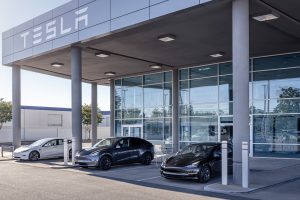- 💰 The U.S. Department of the Treasury has extended the rules for electric vehicle (EV) tax credits, allowing some crucial trace minerals from China to be included in anode materials and battery components.
- 🔋 The U.S. has been trying to reduce automakers’ dependence on foreign materials in their battery packs and requires a higher percentage of battery materials and components to be sourced and built domestically each year.
- 📉 At the beginning of 2024, new rules took effect, disqualifying several EVs from the full $7,500 tax credit due to the sourcing of materials.
- ⏳ The extension gives automakers until 2027 to remove some minerals like graphite, electrolyte salts, binders, and other additives usually sourced from countries listed as a Foreign Entity of Concern.
- 🔄 The decision aims to provide a transition period for automakers to adjust their supply chains and maintain eligibility for the tax credit, which is a significant factor in EV purchases.
- 📣 Not everyone supports the extension, with some arguing that it undermines the goal of reducing dependence on foreign materials for EV production.
- 💬 Senator Joe Manchin, the Senate Energy Committee Chair, criticized the move, stating that it prioritizes flooding the U.S. market with EVs over reducing reliance on other countries for materials.
In a move aimed at supporting the burgeoning electric vehicle (EV) industry, the U.S. Department of the Treasury has granted an extension to the rules governing EV tax credits. This decision allows automakers to continue using certain crucial trace minerals from China in their anode materials and battery components while still qualifying for the coveted $7,500 tax credit.
The Push for Domestic Battery Production
The U.S. government has been actively pursuing measures to reduce automakers’ dependence on foreign materials for battery production. The overarching goal is to foster a self-reliant and robust domestic supply chain for EV batteries, ensuring a secure and sustainable future for the industry.
To achieve this objective, the government has implemented a gradual increase in the required percentage of battery materials and components that must be sourced and built within the United States. However, the transition to a fully localized supply chain is a complex endeavor that requires time and significant investments.
The Tax Credit Extension: A Necessary Compromise?
At the beginning of 2024, new rules took effect, disqualifying several electric vehicles from the full $7,500 tax credit due to the sourcing of materials from certain countries. This development posed a significant challenge for automakers, as the tax credit plays a crucial role in driving consumer demand for EVs.
To address this issue and provide automakers with a much-needed transition period, the Treasury Department has extended the rules until 2027. This extension allows the continued use of materials like graphite, electrolyte salts, binders, and other additives typically sourced from countries listed as Foreign Entities of Concern, including China.
The rationale behind this decision is twofold: first, it aims to prevent a sharp decline in EV sales, which could hinder the broader adoption of electric vehicles in the United States. Second, it provides automakers with a longer runway to reconfigure their supply chains and gradually phase out the reliance on foreign materials.
Opposing Voices and Differing Perspectives
While the extension has been welcomed by automakers and some industry experts, it has also faced criticism from certain quarters. Opponents argue that the move undermines the very purpose of the tax credit program, which is to foster a domestic EV industry that is self-reliant and independent from foreign suppliers.
Senator Joe Manchin, the Senate Energy Committee Chair, has been particularly vocal in his criticism of the decision. Manchin believes that the priority of flooding the U.S. market with EVs has overtaken the need to reduce reliance on other countries for the materials required to build these vehicles.
Critics contend that the extension provides a “long-term pathway” for countries like China to remain entrenched in the U.S. supply chain, potentially hindering the development of a truly self-sufficient domestic industry.
Striking the Right Balance
The debate surrounding the EV tax credit extension highlights the delicate balance that policymakers must strike between accelerating the adoption of electric vehicles and fostering a self-reliant domestic supply chain.
Proponents of the extension argue that a measured approach is necessary to ensure a smooth transition and prevent disruptions that could stifle the growth of the EV market. They contend that a gradual shift towards domestic sourcing, facilitated by strategic investments and incentives, is the most pragmatic path forward.
On the other hand, critics maintain that a more assertive stance is required to wean the U.S. off its reliance on foreign materials and position the domestic industry as a global leader in battery production and innovation.
As the EV industry continues to evolve and mature, it is clear that this debate will persist. Policymakers will need to navigate these competing priorities carefully, ensuring that the U.S. remains at the forefront of the electric vehicle revolution while also fostering a robust and self-reliant domestic supply chain.





